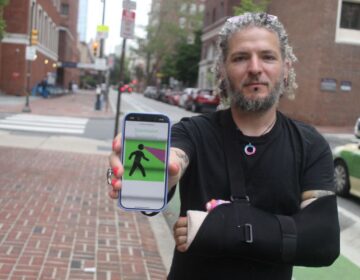Calling for stable funding streams, Hite will attach a price tag to his new action plan

School District of Philadelphia Superintendent William Hite. (NewsWorks photo, file)
Philadelphia schools Superintendent William Hite, seeking to demonstrate that the District is moving forward despite profound financial woes, has released an updated “action plan” for improving city schools.
The 42-page plan takes aim at four “anchor goals” that Hite calls both “aspirational in scope and urgent in nature,” including having 100 percent of 8-year-olds reading on grade level and 100 percent of students graduating with college or job-ready skills.
To achieve this, the plan also sets aspirational goals around human capital and fiscal support. It calls for 100 percent great teachers and principals and 100 percent “of the funding we need for great schools.”
Hite said that this Action Plan 2.0, like Action Plan 1.0 he released a year ago, “is meant to prioritize the work of individuals who work in the District … to align the work of everyone … to support” these goals.
The document, which includes no deadlines or timelines, is designed to “communicate a set of bold expectations for all of our students,” Hite said in a Friday afternoon conference call with reporters. “This talks about a vision, grounded in the fact that it is really important for the School District to deliver on the right of children to a quality education regardless of where they attend school.”
But crucial components needed to make the plan effective – how to obtain more resources from reluctant state and city officials as well as more flexibility from labor unions in how schools use time and deploy staff — are still up in the air.
In an effort to get sufficient revenues to implement the plan, Hite intends to attach a price tag. He said the District would later this week release a financial supplement to “highlight what types of investments we will need from all stakeholders in order to carry out this work.”
He also makes a plea for funding stability, which has eluded the District for several years. “A year-to-year funding mindset cannot continue to be the norm,” the document says.
Hite made it clear that while he will be blunt in seeking more funds, he also intends to change the way the District operates. The document emphasizes fiscal responsibility as one of the District’s five “core values.”
“We are trusted stewards of public resources,” it says.
“This is not about returning to the structure, systems, processes, staffing patterns we’ve had in the past,” Hite said. Instead the District plans to employ “evidence-based” strategies, including more school turnarounds under the Renaissance Schools initiative, in which some of the District’s lowest-performing schools are turned over to outside operators.
Hite said that it is still possible that one or two additional schools will become Renaissance charter schools in September. But for this to happen, the process of matching providers and getting community input would need to start almost immediately.
At the same time, he reiterated that “80 to 90 percent” of the District’s work is to shore up its own schools, while acknowledging that the Promise Academy model for “internal turnaround” is currently in disarray and hobbled by cutbacks. The action plan calls both for honing and improving the Promise Academy model and for strengthening neighborhood schools.
The entire community will have to participate if the District is to have any success, he said, from the political and business community to taxpayers. The District hopes to strengthen partnerships and do more parent outreach.
Hite described the document as a road map for the District’s leadership, The plan is organized around six strategies for achieving the anchor goals:
to improve student learning;
to develop a system of excellent schools;
to identify and develop exceptional, committed people;
to become a parent- and family-centered organization;
to become an innovative and accountable organization, and
to achieve and sustain financial balance.
A longer school day and year, a change that new School Reform Commission Chair Bill Green is touting as necessary, is not explicitly on Hite’s list. But he said it is important, as long as it is accompanied by well-thought-out teaching and learning strategies.
“Many people think by adding time, we will magically produce greater outcomes,” he said. “Adding time by itself doesn’t help do anything.”
At the same time, he said, “You may all recall that in negotiations we proposed going to a much longer day, and while that is not in the document, we feel it is important to extend our day to have greater opportunities for children to participate in activities more likely to engage them and create opportunities for inquiry-based and collaborative learning.”
The District has been negotiating with the Philadelphia Federation of Teachers and other unions for nearly a year without a settlement. In addition to seeking more time, the District is asking the teachers to take a pay and benefits cut and change work rules in a way that will allow more time for meeting and collaboration.
Hite said that he thought it was possible to strengthen the workforce and attract top talent to Philadelphia even in the current contentious atmosphere, in which the District is seeking to erode seniority rights, institute performance-based pay, and demand longer work hours.
He said that one piece of the plan is to change professional development to more in-class coaching and fewer workshops and meetings. And after a year of austerity and giving principals little leeway in deciding how to build a staff with limited funds, he said that a linchpin of his approach is to give schools more decision-making autonomy. “Schools are learning organizations” is another one of the plan’s “core values.”
Autonomy “should be defined around a set of high standards for everyone and strong accountability,” he said. Principals should be making decisions on how time is used, who works in the building, how teachers are recruited and developed, and how money is spent. All of this is now limited by both contractual requirements and District practices.
Hite, who took the helm of the District 16 months ago, cited progress made since he released his first action plan in January, 2013, including improved school safety, a renewed focus on teaching and learning, more openness with data, better charter authorizing, and tighter financial controls. The document includes a two-page scorecard rating the District’s performance over the past year. On most items, it reports “significant progress” or “some progress,” but it acknowledges “little progress” on about a quarter of the items.
The report claims “some progress” in providing adequate services to special education students and English language learners.
Hite indicated that he is planning to overhaul how resources are deployed among schools, saying that the groundwork is being laid for “weighted student funding,” which seeks to send money to schools based on the needs of students. The District piloted such a plan under former Superintendent Arlene Ackerman before it was hit with devastating budget cuts in 2011.
The plan describes high-quality education for all children as a “civil right,” which could signal that the District plans a more activist approach in demanding adequate resources. Several advocacy groups have been cataloguing complaints from parents and teachers about inadequate services, and local organizations have signaled their intent to file a lawsuit concerning the funding situation.
While Hite intends to make a strong case for more funds, he also said that District employees should not expect the return of all laid-off workers even if dollars should come through.
The document puts an optimistic face on the results of the District’s funding requests for this year. It asked for $180 million in recurring funds from the city and state, but has so far received just $112 million, most of that in one-time dollars. State and city leaders have failed to come to agreement on a proposed extension of a 1 percent city surcharge on the state sales tax, which would generate more than $120 million annually in new revenue.
The goal of getting all students to reading on grade level by age 8 will require more preschool investment, Hite said, and the high school graduation goal needs more attention to neighborhood schools and alternative schools that take in students who have had trouble navigating the regular system.
All schools have to be great, he said.
“Our strategy just can’t be attracting the smartest kids to certain schools,” Hite said, referring to the special admission schools and some charters. “We have to give time and attention to schools in the neighborhoods.”
He declined to describe his plan as an effort to sell the District to its funders.
“This is a strategy to communicate what works,” he said.
NewsWorks republishes articles from the Philadelphia Public School Notebook, an independent, nonprofit news service covering Philadelphia’s public schools since 1994, for a wider audience.
WHYY is your source for fact-based, in-depth journalism and information. As a nonprofit organization, we rely on financial support from readers like you. Please give today.




